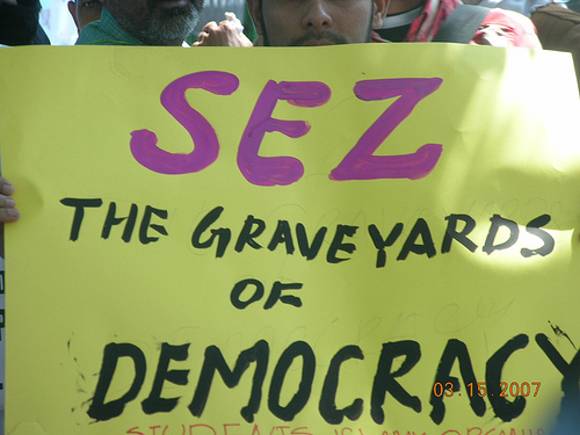
A neoliberal development pathway for Punjab?
 Earlier this month TLH discussed how the unseasonably dry summer in Punjab is threatening its agriculture and economy. This week, the Punjab Assembly adopted a resolution authorizing the development of additional Special Economic Zones, or SEZs, while streamlining and supporting the existence of pre-existing SEZs.
Earlier this month TLH discussed how the unseasonably dry summer in Punjab is threatening its agriculture and economy. This week, the Punjab Assembly adopted a resolution authorizing the development of additional Special Economic Zones, or SEZs, while streamlining and supporting the existence of pre-existing SEZs.
SEZs are not entirely new to Punjab. In 2006, Punjab cleared thirteen (13) SEZs for development and approval, and the proposal was approved by the Indian central government in 2007. The current number of “greenlit” SEZs in Punjab currently totals 12, but the number could increase extensively.
SEZs have a mixed review in development literature. The current Punjab policy creates a categorical pollution, labor, and tax exemption for new businesses. Neoliberal theorists tout SEZs as excellent models of “free market” development. Companies within SEZs have free range to do pretty much whatever they want, and there is no formal method of accountability unless a government revokes the SEZ (but that, too, can be difficult to revoke for political and legal reasons).
It is that lack of formal accountability that often undermines worker power and worker capacity. Punjab has focused largely on attracting electronics and engineering SEZs, but it is unclear if this helps diversify the Punjab economy, or if it simply creates another dependency model of economic organization.
Beyond the question of economic organization and development, however, is a larger question of what a just social/economic order would look like. What could the alternatives be? And further, what values would an economic order embrace if it were to conform to principles of Sikhi? Punjab is not a theocracy, and I understand that the goal is not to conform its economy with a religious order. However, perhaps there is a valuable conversation around what it would mean to decrease unemployment while increasing economic parity across the Punjabi population.
SEZs don’t incorporate the values advanced by “double bottom line” companies, but perhaps this moment of economic reorganization is a political moment in which Punjab can restructure its economic and social goals. Perhaps it is an opportunity to ask whether our policy goals can create space for our professional lives to integrate our social and personal values. What would an alternate development policy look like to you, and what kinds of goals would you want it to accomplish?














These Special Economic Zones (SEZ's) seem like thirteen more safe havens to get rich quick – where labor, environment and tax laws can be flouted with full support of state government. It sets up an opportunity for legal arbitrage. Laws that cannot be broken elsewhere, can be broken in these zones. Its surely going to help a few.
The hope for the general population with these kinds of SEZ's is that it might have some "trickle down economic effect". I dont see how these zones are even remotely aligned to goals of double bottom line or are pro-sikhi.
On the other hand, the government needs to be working on building safety nets for the weakest/bottom rung of the economic ladder. Widows, orphans, disabled, and lifes losers need help/security to live a life of dignity – without fear or anxiety. Policies catered towards these groups are infact pro-sikhi policies.
One example of this is developing the Insurance sector, and providing life insurance to all low income families thoughout the state. It is not uncommon to see families get devastated by the loss of a primary bread winner.
There is a lot that can be done along these lines.
These Special Economic Zones (SEZ’s) seem like thirteen more safe havens to get rich quick – where labor, environment and tax laws can be flouted with full support of state government. It sets up an opportunity for legal arbitrage. Laws that cannot be broken elsewhere, can be broken in these zones. Its surely going to help a few.
The hope for the general population with these kinds of SEZ’s is that it might have some “trickle down economic effect”. I dont see how these zones are even remotely aligned to goals of double bottom line or are pro-sikhi.
On the other hand, the government needs to be working on building safety nets for the weakest/bottom rung of the economic ladder. Widows, orphans, disabled, and lifes losers need help/security to live a life of dignity – without fear or anxiety. Policies catered towards these groups are infact pro-sikhi policies.
One example of this is developing the Insurance sector, and providing life insurance to all low income families thoughout the state. It is not uncommon to see families get devastated by the loss of a primary bread winner.
There is a lot that can be done along these lines.
Educate people try to be happy at every time they find their happiness in each and every thing they live happy and try to make other happy through many thing either with their good attitude or helping them.
The key park of education is mostly one of attaining universal primary education and adult literacy. The report made by the secretary general of the United Nations within the context of the decade for the extinction of poverty confirms that universal education is central to the fight against poverty.
you got to work hard to earn lots of money because it is not very easy to earn::